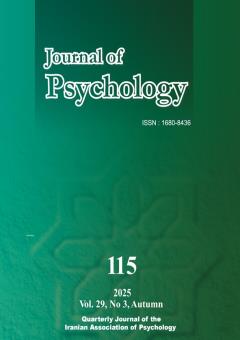The relationship between behavioral brain systems and smartphone addiction in students: the mediating role of attachment style
Subject Areas : روانشناسیYeganeh Mohammadi Tahroodi 1 , Mojtaba Rajab pour 2 *
1 - Department of Clinical Psychology, Semnan Branch, Islamic Azad University, Semnan, Iran.
2 - Department of Clinical Psychology, Semnan Branch, Islamic Azad University, Semnan, Iran.
Keywords: behavioral brain systems, attachment style, smartphone addiction, student,
Abstract :
The aim of the present study was to investigate the relationship between behavioral brain systems and smartphone addiction in students with the mediating role of attachment style. The research method of the present study was descriptive correlational (structural equation type). The statistical population of the study included all students of Islamic Azad University, Semnan Branch in 1403. The available sampling method was used and a sample of 344 people was selected based on the Morgan table. The tools used in this study included the Carver and White Brain/Behavioral Systems Scale (BIS, BAS), Zhao Mobile Phone Addiction Questionnaire, and Collins and Reed Attachment Style Questionnaire (RAAS), which were completed by the participants. Data were analyzed using SPSS version 25 and AMOS version 25 software using normality tests, Pearson correlation, and structural equations. The findings showed that the behavioral inhibition system was positively related to smartphone addiction and the behavioral activation system was negatively related to smartphone addiction. Also, the attachment styles of Closeness and Anxiety were negatively and positively related to smartphone addiction, respectively. The structural model of the study confirmed that attachment styles act as mediators in the relationship between behavioral brain systems and smartphone addiction. The results of this study indicate that behavioral brain systems and attachment styles play an important role in smartphone addiction. These findings can help develop psychological interventions to reduce smartphone addiction and improve the mental health of students.
حجتی، قصیده، نقش، زهرا، خدایاری فرد، محمد.(2021).رابطۀ بين سبک دلبستگی و هويت اخلاقی: نقش واسطهای همدلی.مجله روانشناسی، 2(25)، 215-235. http://www.iranapsy.ir/ar/Article/27236
قدیمی باویل علیائی، نگار، بیرامی، منصور.(2023).روابط ساختاری سبکهای دلبستگی و نشانههای افسردگی اساسی نوجوانان با واسطهگری تحمل پریشانی و انعطافپذیری شناختی. مجله روانشناسی، 2(27)، 134-143. http://iranapsy.ir/Article/39841
محمودی، هیوا.(2019).رابطه سبکهای دلبستگی و گرایش به خودکشی با نقش تعدیلکنندگی خودانتقادی و وابستگی در دانشجویان. مجله روانشناسی، 4(23)، 424-439. http://iranapsy.ir/Article/21667
Alhassan, A. A., Alqadhib, E. M., Taha, N. W., Alahmari, R. A., Salam, M., & Almutairi, A. F. (2018). The relationship between addiction to smartphone usage and depression among adults: A cross-sectional study. BMC Psychiatry, 18(1), 1–8. https://doi.org/10.1186/s12888-018-1745-4
Andreassen, C. S., Billieux, J., Griffiths, M. D., Kuss, D. J., Demetrovics, Z., Mazzoni, E., & Pallesen, S. (2016). The Relationship between Addictive Use of social media and Video Games and Symptoms of Psychiatric Disorders: A Large-Scale Cross-Sectional Study. Psychology of Addictive Behaviors, 30, 252-262. https://doi.org/10.1037/adb0000160
Bachmann, C. J., Beecham, J., O’Connor, T. G., Scott, A., Briskman, J., & Scott, S. (2019). The cost of love: Financial consequences of insecure attachment in antisocial youth. Journal of Child Psychology and Psychiatry, 60(12), 1343–1350. https://doi.org/10.1111/jcpp.13103
Cha, S. S., & Seo, B. K. (2018). Smartphone use and smartphone addiction in middle school students in Korea: Prevalence, social networking service, and game use. Health Psychology Open, 5(1), 1–7. https://doi.org/10.1177/2055102918755046
Eichenberg, C., Schneider, R., & Rumpl, H. (2024). Social media addiction: Associations with attachment style, mental distress, and personality. BMC Psychiatry, 24(1), 278. https://doi.org/10.1186/s12888-024-05709-z
Fraley, R. C., & Roisman, G. I. (2019). The development of adult attachment styles: Four lessons. Current Opinion in Psychology, 25, 26–30. https://doi.org/10.1016/j.copsyc.2018.02.008
Kahnt, T., Heinzle, J., Park, S. Q., & Haynes, J. D. (2011). Decoding the formation of reward predictions across learning. The Journal of neuroscience: the official journal of the Society for Neuroscience, 31(41), 14624–14630. https://doi.org/10.1523/JNEUROSCI.3412-11.2011
Lee, E. J., & Kim, H. S. (2018). Gender differences in smartphone addiction behaviors associated with parent–child bonding, parent–child communication, and parental mediation among Korean elementary school students. Journal of Addictions Nursing, 29(4), 244–254. https://doi.org/10.1097/jan.0000000000000254
Mikulincer, M., & Shaver, P. R. (2020). Attachment theory: A behavioral systems approach for studying species-universal and individual-differences aspects of the social mind. The Sage handbook of evolutionary psychology, 1, 260-282. https://doi.org/10.4135/9781529739442.n15
Panova, T., & Carbonell, X. (2018). Is smartphone addiction really an addiction? Journal of Behavioral Addictions, 7(2), 252–259. https://doi.org/10.1556/2006.7.2018.49
Schou Andreassen, C., Billieux, J., Griffiths, M. D., Kuss, D. J., Demetrovics, Z., Mazzoni, E., & Pallesen, S. (2016). The relationship between addictive use of social media and video games and symptoms of psychiatric disorders: A large-scale cross-sectional study. Psychology of addictive behaviors : journal of the Society of Psychologists in Addictive Behaviors, 30(2), 252–262. https://doi.org/10.1037/adb0000160
Srivastava, S., & Singh, A. (2020). Relationship between Internet dependency and mental health of adolescents: The psychology of internet use. International Journal of Scientific and Research Publications, 10(12). https://doi.org/10.29322/IJSRP.10.12.2020.p10853
Sun, C., Sun, B., Lin, Y., & Zhou, H. (2022). Problematic Mobile Phone Use Increases with the Fear of Missing Out Among College Students: The Effects of Self-Control, Perceived Social Support and Future Orientation. Psychology research and behavior management, 15, 1–8. https://doi.org/10.2147/PRBM.S345650
Sohn, S. Y., Krasnoff, L., Rees, P., Kalk, N. J., & Carter, B. (2021). The association between smartphone addiction and sleep: A UK cross-sectional study of young adults. Frontiers in Psychiatry, 12, 629407. https://doi.org/10.3389/fpsyt.2021.629407
Zhang, W., Zhou, F., Zhang, Q., & Lyu, Z. (2022). Attachment anxiety and smartphone addiction among university students during confinement: Teacher-student relationships, student-student relationships and school connectedness as mediators. Frontiers in public health, 10, 947392. https://doi.org/10.3389/fpubh.2022.947392

